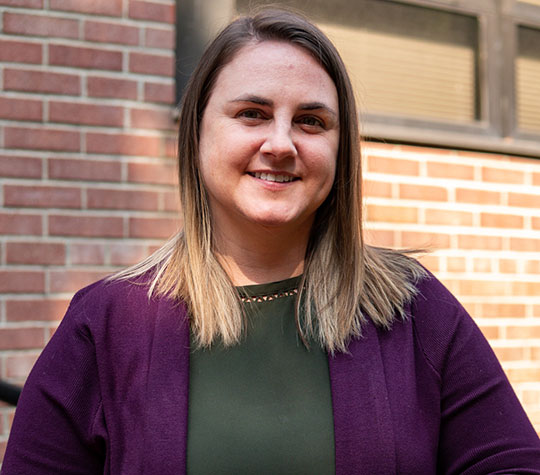Alfred University awarded $4.64 million federal grant to fund Mental Health Demonstration Project

Alfred University has been awarded a $4.64 million grant from the U.S. Department of Education to fund a program in the University’s Counseling and School Psychology Program, which aims to increase the supply of quality mental health professionals to rural schools.
Angeline Felber, assistant professor of counseling at Alfred University, applied for and was awarded the grant from the Department of Education to support the Mental Health Demonstration Project. Fully funded by federal dollars over a five-year period, the grant will expand Alfred University’s ability to support school counseling students who are interning in partner school districts in the region, which due to its rural location is typically underserved.
“Research suggests that rural youth face difficulties in accessing professionals who can provide high-quality mental health care,” said Kevin Curtin, professor of counseling and chair of the Division of Counseling and School Psychology. “This grant allows Alfred University to increase the number of mental health and school counseling students who are able to significantly support the mental health needs of students in our local rural area, ultimately strengthening the career pipeline of professional counselors working in schools.”
Each year, the program will provide stipends for up to 12 counseling interns and their supervisors at four partner school districts in the area: Hornell City School District and Canisteo-Greenwood School District in Steuben County, Bolivar-Richburg School District in Allegany County, and Franklinville School District in Cattaraugus County.
“The goal is to increase the number and quality of mental health professionals, especially counselors, in rural school district in Allegany and Steuben counties,” Felber said, explaining that because of their rural location, schools in the area face barriers to obtaining quality counseling care. These include difficulties for students in local schools to travel to obtain counseling service, and for counselors to travel to the schools.
“We will be able to pay interns and their supervisors at their schools and cover their travel expenses” Felber said. “Without this money, rural schools wouldn’t be able to offer internships.”
In addition to providing funding for paid internships, the Mental Health Demonstration Project will also support:
- A full-time graduate assistant for the Alfred University Division of Counseling and School Psychology.
- Four Social Emotional Learning specialists who, Felber said, will take a “holistic” approach to serving students, with a goal of not only improving their academic performance but also helping them develop interpersonal and social skills and improve their mental health.
- A professional coaching program, which will provide “coaches” who advise interns on professional development.
- A diversity, equity, and inclusion development track, where DE&I consultants hold professional workshops for interns and their supervisors at their respective schools.
- An integrated pediatric training program. Interdisciplinary in nature, this component creates opportunities for collaboration and cooperation between counselors and pediatricians in the area, improving communications between the schools and pediatric care providers.
Felber stressed that the Mental Health Demonstration Project is an “interdisciplinary partnership” which involves collaboration from several different entities—Alfred University, host school districts, the pediatric care community, and the New York Mental Health Counselors Association (NYMHCA)—working together for a common goal: improving students' mental health.
The program provides benefits for both students—who gain valuable work experience—and the school districts where they work—whose students will receive services that otherwise may not be available.
“The big benefit is money,” Felber commented. “Graduate school is very expensive. Counseling grad students typically don’t get paid for their internships, and that can be a deterrent” to students enrolling in graduate school for school counseling.
In exchange for receiving paid internships through the program, interns sign a three-year service agreement committing to serve in high needs rural school districts in Steuben and Allegany counties after graduating from Alfred University with master’s in education degrees in school counseling, school psychology, and mental health counseling.
Felber said additional school districts in the area could benefit from the program, gaining the services of paid interns from Alfred University. The greater goal, Felber points out, is to see the program replicated across the country and for New York State to recognize the benefits of the program and provide longer term funding.
“It’s a demonstration project, a pilot program,” Felber said. “We want to show that it is effective and worthwhile and something that can be sustainable on a broader scale.”
